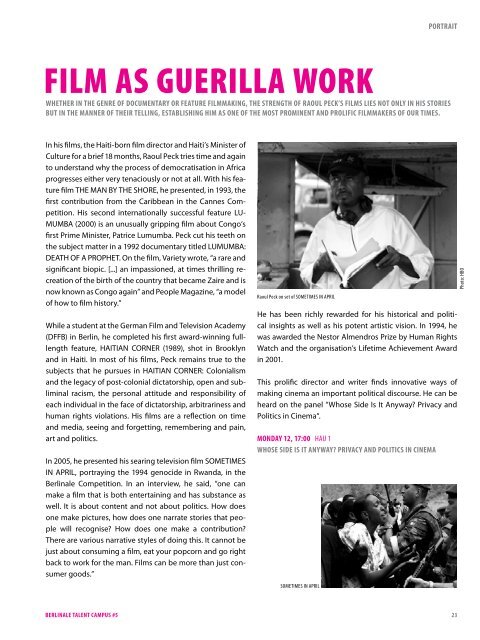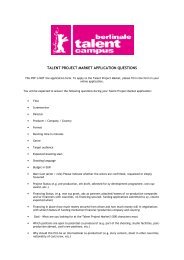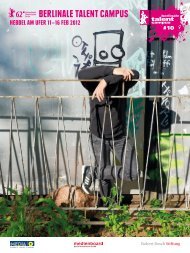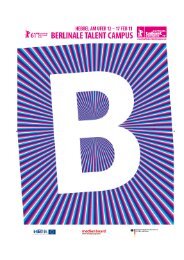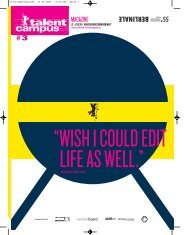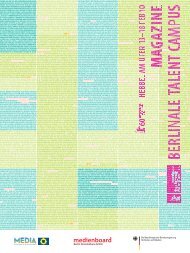MAGAZINE - Berlinale Talent Campus - Top-IX
MAGAZINE - Berlinale Talent Campus - Top-IX
MAGAZINE - Berlinale Talent Campus - Top-IX
Create successful ePaper yourself
Turn your PDF publications into a flip-book with our unique Google optimized e-Paper software.
PORTRAITFILM AS GUERILLA WORKWHETHER IN THE GENRE OF DOCUMENTARY OR FEATURE FILMMAKING, THE STRENGTH OF RAOUL PECK’S FILMS LIES NOT ONLY IN HIS STORIESBUT IN THE MANNER OF THEIR TELLING, ESTABLISHING HIM AS ONE OF THE MOST PROMINENT AND PROLIFIC FILMMAKERS OF OUR TIMES.In his films, the Haiti-born film director and Haiti’s Minister ofCulture for a brief 18 months, Raoul Peck tries time and againto understand why the process of democratisation in Africaprogresses either very tenaciously or not at all. With his featurefilm THE MAN BY THE SHORE, he presented, in 1993, thefirst contribution from the Caribbean in the Cannes Competition.His second internationally successful feature LU-MUMBA (2000) is an unusually gripping film about Congo‘sfirst Prime Minister, Patrice Lumumba. Peck cut his teeth onthe subject matter in a 1992 documentary titled LUMUMBA:DEATH OF A PROPHET. On the film, Variety wrote, “a rare andsignificant biopic. [...] an impassioned, at times thrilling recreationof the birth of the country that became Zaire and isnow known as Congo again” and People Magazine, “a modelof how to film history.”While a student at the German Film and Television Academy(DFFB) in Berlin, he completed his first award-winning fulllengthfeature, HAITIAN CORNER (1989), shot in Brooklynand in Haiti. In most of his films, Peck remains true to thesubjects that he pursues in HAITIAN CORNER: Colonialismand the legacy of post-colonial dictatorship, open and subliminalracism, the personal attitude and responsibility ofeach individual in the face of dictatorship, arbitrariness andhuman rights violations. His films are a reflection on timeand media, seeing and forgetting, remembering and pain,art and politics.In 2005, he presented his searing television film SOMETIMESIN APRIL, portraying the 1994 genocide in Rwanda, in the<strong>Berlinale</strong> Competition. In an interview, he said, “one canmake a film that is both entertaining and has substance aswell. It is about content and not about politics. How doesone make pictures, how does one narrate stories that peoplewill recognise? How does one make a contribution?There are various narrative styles of doing this. It cannot bejust about consuming a film, eat your popcorn and go rightback to work for the man. Films can be more than just consumergoods.”Raoul Peck on set of SOMETIMES IN APRILHe has been richly rewarded for his historical and politicalinsights as well as his potent artistic vision. In 1994, hewas awarded the Nestor Almendros Prize by Human RightsWatch and the organisation’s Lifetime Achievement Awardin 2001.This prolific director and writer finds innovative ways ofmaking cinema an important political discourse. He can beheard on the panel “Whose Side Is It Anyway? Privacy andPolitics in Cinema“.MONDAY 12, 17:00 HAU 1WHOSE SIDE IS IT ANYWAY? PRIVACY AND POLITICS IN CINEMASOMETIMES IN APRILPhoto: HBOBERLINALE TALENT CAMPUS #523


